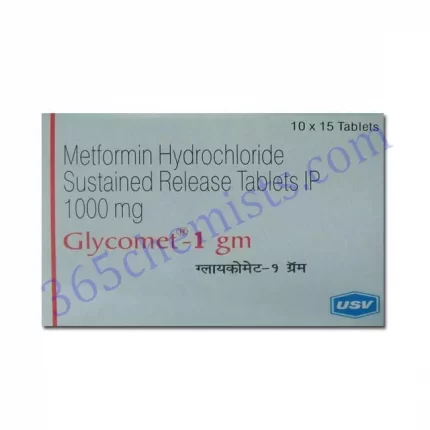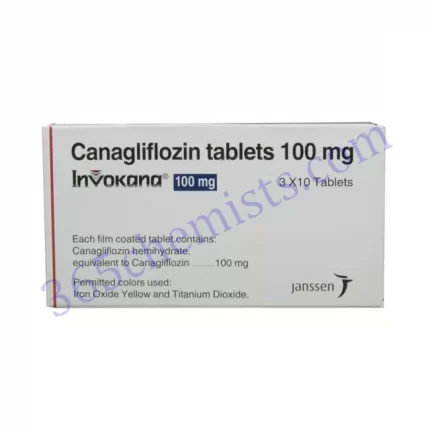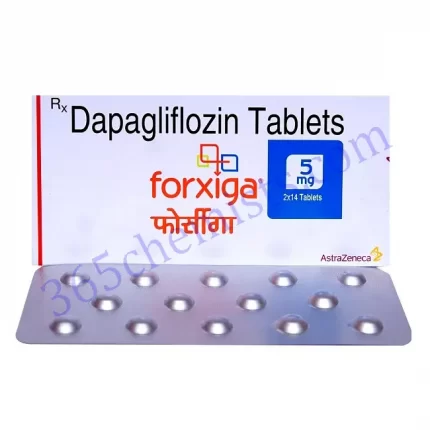INTRODUCTION
GLYCIPHAGE 250 MG contains Metformin hydrochloride which belongs to a group of medicines known as biguanides. Diabetes is a condition where the pancreas does not make enough insulin, a hormone which makes your body take in glucose (sugar) from the blood. This leads to a high level of glucose in your blood.
GLYCIPHAGE 250MG helps to lower your blood glucose to normal level. It is an antihyperglycemic agent used in patients with type 2 diabetes which improves glucose tolerance. In liver it suppresses hepatic gluconeogenesis (glycogen breaks down into glucose-1-phosphate and glycogen and glycogenolysis (breakdown of glycogen to glucose) which is responsible for lowering of blood glucose in diabetic patients.
Your doctor decides upon the dose depending on your age, other medications you take and based on your problems related to kidney or liver. This medicine is not recommended for breastfeeding mothers. The common side effects of GLYCIPHAGE 250MG are nausea, vomiting, headache, diarrhoea and abdominal pain. This medicine is suitable for children and adolescents over 10 years of age as recommended by your physician.
USES OF GLYCIPHAGE 250MG
- Treats type 2 diabetes (non-insulin dependent diabetes)
HOW GLYCIPHAGE 250 MG WORKS
GLYCIPHAGE 250 MG works by reducing the amount of sugar releases by liver into your blood. Metformin acts by decreasing glucose production from the liver and decreases absorption of glucose from the intestine after taking food while improving the sensitivity of the body organs and muscles towards insulin, thus helping in controlling the blood sugar level.
DIRECTIONS FOR USE
Always take GLYCIPHAGE 250 MG exactly as instructed by your doctor. Take the medicine with or after a meal. It will avoid you from having side effects like affecting your digestion. Do not crush or chew the medicine. Swallow with a glass of water.
SIDE EFFECTS OF GLYCIPHAGE 250 MG
COMMON
- Nausea and vomiting
- Diarrhoea
- Abdominal pain
- Loss of appetite
- Changes in taste
RARE
- Lactic acidosis
- Inflammation of the liver
- Redness of the skin(erythema), itching or an itchy rash (hives)
- Low vitamin B12 levels in the blood
Stop taking GLYCIPHAGE 250 MG and contact your doctor immediately if you experience symptoms of lactic acidosis because it can lead to coma
Related Product
Glyciphage 250mg Tablet
Glyciphage 500mg Tablet
Glyciphage 850mg Tablet
Glyciphage SR 1gmTablet
Glyciphage SR 500mg Tablet
Glyciphage SR 850mg Tablet
Glyciphage G 1 Forte Tablet
Glyciphage G 2 Forte Tablet
Glyciphage G 1 Tablet
Glyciphage G 2 Tablet
Glyciphage PG 1 Tablet
Glyciphage PG 2 Tablet
Glyciphage VG1 Tablet
Glyciphage VG2 Tablet
HOW TO MANAGE SIDE EFFECTS
Feeling sick (nausea) or vomiting:
Try simple meals and do not eat oil rich or spicy foods.
Diarrhoea:
Drink plenty of fluids to avoid dehydration. ORS should be used to prevent dehydration.
Abdominal pain:
Keep a hot water bottle or heated bag on your abdomen. Drink plenty of clear fluids and water.
WARNING & PRECAUTIONS
PREGNANCY
GLYCIPHAGE 250 MG should be used with caution in pregnant women. Consult your doctor before taking.
BREASTFEEDING
GLYCIPHAGE 250 MG is not recommended for use in breastfeeding women unless necessary. Discuss the risks and benefits with your doctor.
DRIVING AND USING MACHINES
GLYCIPHAGE 250 MG should be used with caution while driving or operating machines since it can cause side effects related with low blood sugar such as increased sweating, fast heartbeat, vision changes, particularly when used with other diabetic drugs.
ALCOHOL
Avoid taking excessive alcohol during the treatment with GLYCIPHAGE 250 MG since this may increase the risk of lactic acidosis.
KIDNEY
GLYCIPHAGE 250MG is not recommended in patients with severe kidney disease. Consult your doctor for advice.
LIVER
GLYCIPHAGE 250MG is not recommended in patients with severe liver disease. Consult your doctor for advice.
ALLERGY
Do not take GLYCIPHAGE 250MG, if you are allergic (hypersensitive) to metformin hydrochloride or any of its other ingredients.
HEART DISEASE
GLYCIPHAGE 250MG is not recommended in patients with severe heart disease. Consult your doctor for advice.
OTHERS
Inform your doctor if you have a condition such as uncontrolled diabetes (severe hyperglycaemia) and severe infection (lung or bronchial system)
Use in pediatrics:
GLYCIPHAGE 250MG can be used in children between 10 and 16 years of age. Consult your doctor for advice before initiating the treatment.
Use in geriatrics:
GLYCIPHAGE 250MG should be used with caution in elderly patients, especially, with kidney disease.
INTERACTIONS
Tell your doctor if you are taking or have recently taken any other medicines, including medicines obtained without a prescription or the following:
- Diuretics (increase urine production)
- Ibuprofen and celecoxib (used to treat pain and inflammation)
- ACE inhibitors and angiotensin ii receptor antagonists (treatment of high blood pressure)
- Salbutamol or terbutaline (used to treat asthma)
- Corticosteroids (used to treat severe inflammation of the skin or in asthma)
- Verapamil, rifampicin, cimetidine, dolutegravir, ranolazine, trimethoprim, vandetanib,
- Isavuconazole, crizotinib, olaparib
- Other medicines used to treat diabetes (sulphonylureas, insulin, meglitinides)
Overdosage:
If you or anyone else accidentally took too much of GLYCIPHAGE 250MG, consult your doctor immediately. Overdose may cause symptoms such as very low blood sugar and increase the chance of developing lactic acidosis (buildup of lactic in blood).












